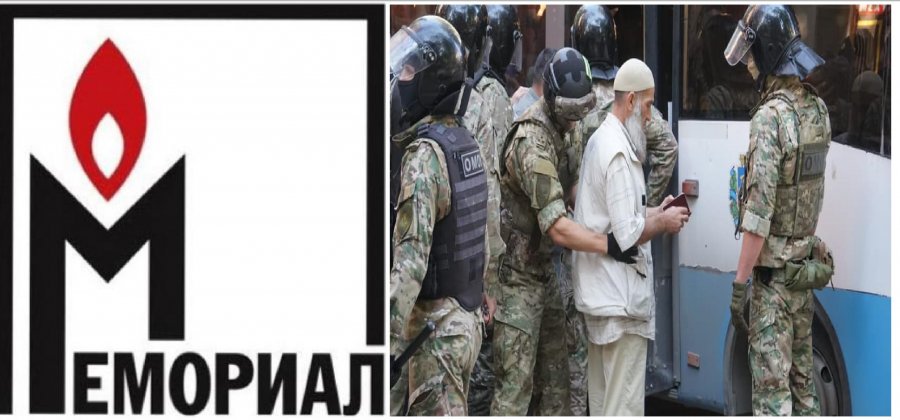Russia moves to dissolve Memorial NGOs that defend political prisoners and expose Russian aggression against Ukraine

Russia has taken legal steps to get both the International Memorial Society and the Memorial Human Rights Centre forcibly dissolved. In both cases, alleged infringements of the notorious ‘Foreign Agents’ law are cited as the pretext, however the two organizations, which play a vital role in monitoring political and religious persecution in Russia and occupied Crimea, have long faced different forms of attack.
The original reports, perhaps deliberately, only pertained to the International Memorial Society. This is one of Russia’s oldest NGOs and played an inestimable role in uncovering the crimes of the Soviet regime and information about victims of Stalin’s Terror. There are branches throughout the Russian Federation, as well as organizations, like the Memorial Human Rights Centre, which are linked, but are different legal entities, with their own particular focus. Over recent years, Memorial HRC has followed cases of persecution in both Russia and occupied Crimea and plays a vital role in recognizing people as political prisoners in accordance with international criteria.
In a statement issued in both Russian and English on 11 November 2021, International Memorial reported only the attack on itself, stating that the Prosecutor General was accusing it of systematically infringing the ‘Foreign Agents’ Law, in particular, the requirement to state on literally any material that the organization has been labelled a ‘foreign agent’. The hearing, it said, was scheduled for 25 November. The statement stresses opposition from the outset to the ‘foreign agent’ legislation which it calls “unlawful and consciously designed to suppress civil society”. While the law is in place, however, the NGO is fulfilling its requirements and there are no grounds for dissolving it. It ends by stating that: “The decision to abolish International Memorial is politically motivated. It aims to destroy the organization which deals with the political repressions of the past and fights for human rights today.”
It was, in fact, clear from a report from Interfax.ru, which cited the Prosecutor General’s Office as its source, that the Memorial Human Rights Centre was also under attack, and this was confirmed by Memorial HRC itself on 12 November. The Moscow prosecutor’s office has sent an application to the Moscow City Court to have the latter NGO dissolved.
The Russian authorities have not always hidden behind the law on so-called ‘foreign agents’ for their attack on International Memorial (added to the ‘foreign agent’ register in 2016 and the Memorial HRC (added in 2013). In November 2015, Russia’s Justice Ministry accused Memorial HRC of ““undermining the foundations of the constitutional order” by forming negative public opinion “regarding the state policy undertaken by the highest bodies of State power; by expressing disagreement with the decisions and actions of the said Institutes of power, with the results of criminal investigations and court verdicts on high-profile criminal cases”. One of the examples cited was Memorial HRC’s statement that Russia’s actions against Ukraine fall under the definition of aggression, and that in its view “there was direct engagement by Russian soldiers in fighting on the territory of another country. – against the legitimate authorities of a neighbouring country” (more details here).
Both International Memorial and Memorial HRC began coming under attack long before the Foreign Agents law was chosen as a convenient weapon. In October 2014, the Prosecutor General also asked the Supreme Court to dissolve International Memorial. At that time, various alleged organizational infringements were used as the excuse, and it was also clear from the propaganda campaign run by such notorious outfits as NTV, that an attempt was being made to present Memorial as an organization supporting ‘extremists’.
Worth noting that the forced inclusion of International Memorial on the ‘foreign agent’ register was also linked with Ukraine. Five ‘offending’ pronouncements were cited which proved Memorial’s ‘political activities’. Three were criticism of the law on ‘foreign agents’; one was about the killing near the Kremlin of Russian President Vladimir Putin’s fiercest critic Boris Nemtsov and protest over the engagement of Russian forces in Ukraine.
It became worryingly clear back in 2019 that the Russian regime was trying to use exorbitant fines for alleged infringements of the law on ‘foreign agents’ to crush both International Memorial and Memorial HRC. Memorial initiated a donation page to help pay the millions of roubles in fines imposed on them, sometimes merely for having failed to write the required words about supposedly being a ‘foreign agent’ on a social media post. It is not entirely clear why the regime backed off from its attempt to get International Memorial dissolved in 2014, but there is just a chance that it was due to international outrage.
The voices of protest need to be even louder now, as this attempt to eliminate both vital organizations comes as the number of political prisoners both in Russia and in occupied Crimea is inexorably rising, with Russia using all kinds of repressive measures, including 20-year sentences; mass detentions and the jailing of a rights lawyer to silence those who speak out against repression in Crimea.





